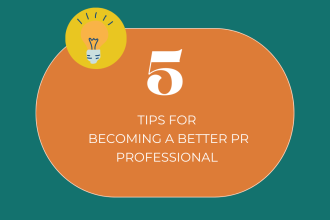
Monday September 12, 2022
Five reasons to consider moving from journalism to PR
For almost all my career, I’d been a journalist, with lead roles at the likes of Saga and Reader’s Digest and writing for everyone from the Daily Mail to trade magazines. I always loved doing PR projects in my job, but I’d never worked in the sector full-time. Not until the summer of 2021. A lot of journalists can be cynical about going into PR. However, my experiences suggest they should put their cynicism to one side.
There can be more variety at a PR agency than in journalism
I was lucky enough to work for general interest magazines and newspapers, covering everything from the latest health innovations to interviews with famous actors to people being rescued from the side of cliffs. However, many journalists often find themselves in a bit of a niche – whether it’s at an accountancy journal or a celebrity gossip magazine.
But in the last year, since going from journalism to PR, I have worked with innovative London schools, international sustainability prizes and space projects, amongst many others. It really is the case that you can’t be sure exactly what sort of client you are going to be working with next. Yes, PRs can be full-time employees of large utility firms or food companies, perhaps doing similar things week in, week out… But when you’re at a PR agency, that’s never likely to happen.
Journalist skills are highly valued in PR
A lot is often made about the differences between PR and journalism. But there are far more similarities. If you can write and research an excellent article, organise an interview with an important figure, cleverly target the best media outlets for a story and persuade editors to run a piece, you are probably a good journalist. But you could just as easily be a good PR.
If you’ve been in the media for a few years, you’ll be amazed at how much knowledge of how it works you’ve acquired or how good you’ve probably become at dreaming up and researching stories. These are skills that a client, looking for media coverage ideas, will find incredibly useful.
You can give clients media training, too. Most people don’t talk to journalists very often – if ever – so if you can tell them how to do it and how to get their key points across. You know, because it was once you asking the questions and looking for just the right sort of answers.
You can make a visible difference in PR
Most journos aren’t doing coruscating exposés of government scandals. They are producing probably very entertaining or useful pieces for people to read for pleasure or to learn more about their industry. That’s all very useful. Knowledge is, of course, power.
It’s often hard for journalists to really see the impact their work is having, though. If you work for a PR firm, however, you can see how the press coverage you’ve secured is boosting a company’s profile and possibly sales, help raise thousands for a charity or produce content that tells a client’s true story, the way they want it to be told.
PR is dynamic and exciting
The idea of working to targets and important client needs could put some people off moving from journalism to PR. It may sound a little corporate. But the truth is that PR is a fast-paced, flexible sector with some brilliant people working in it who are often more creative and multi-talented than anyone else in the media. In what other job do you get to do everything from producing short films to writing articles about new technological marvels to using your diplomatic skills to persuade national newspapers to see your point of view?
PR is a growth industry
Let’s be honest, the past 20 or so years – even since Tim Berners-Lee invented the internet – have been a little dispiriting for journalists. Much-loved magazines have closed, once-proud local newspapers have become little more than freesheets. And wages have gone down considerably in real terms. Once, the editor of a national consumer magazine might be able to afford a large house in the country. Now, it’s more likely to be a flat in Stoke Newington.
PR, however, is thriving, with one estimate expecting the global PR market to rise from $88 billion in 2020 to £129 billion in 2025.
Being a writer may be a noble profession, but working in a sector that is clearly declining does not inspire the sort of confidence and sense of purpose you get from working in one that has a bright future.
Curzon PR is a London-based PR firm working with clients globally. If you have any questions, please feel free to contact our Business Development Team bd@curzonpr.com







Follow us